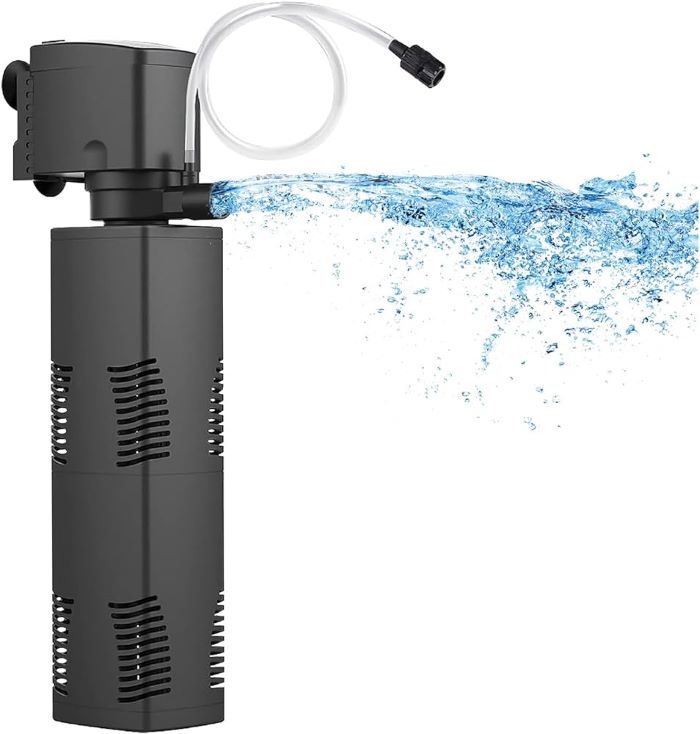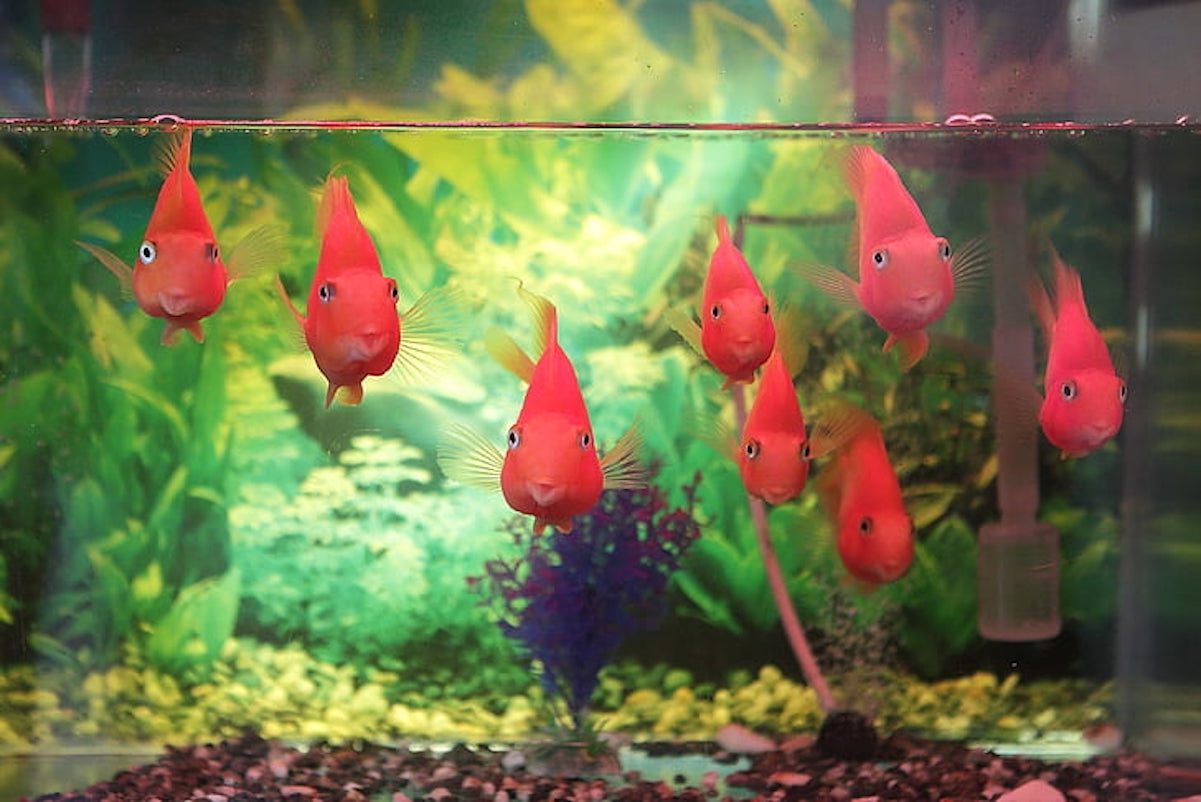The Best Aquarium Filter: Ammonia and nitrite are two of the most toxic compounds that can kill plants and animals in an aquarium. Filters assist eliminate these contaminants. By removing organic waste and extra food, it keeps your fish and plants in an environment that is steady and healthy. Additionally, it improves the water’s oxygen levels, which is beneficial for fish.
Your tank’s dimensions, the aquatic life you’re housing, and your preferences will all determine which aquarium filter is ideal. Here are a few well-liked choices:
- Oase Biomaster 250 Filter
- Marineland Magniflow Aquarium Filter
- AquaClear Fish Tank Filter
- Tetra Whisper Internal Filter
- Fluval FX6 Aquarium Filter
- Aqueon Quietflow Filters
- Polar Aurora Filter
- Penn Plax Cascade Canister Filter
Here we will provide you a comprehensive overview to help you better understand this query with more regular detail and accurate facts. With its helpful instructions, you may enhance the filter selection process for both personal and authentication purposes.
What follows is an in-depth examination of the matter.
Table of Contents
Aquarium Filters

Filters are essential for keeping an aquarium’s aquatic inhabitants in a stable and healthy condition. Since the aquarium won’t work properly without the filter, you might assume that it is necessary and important. We recommend using the top filter for;
- Filters keep water clean and healthy for aquatic life by removing waste, uneaten food, and dangerous pollutants.
- Lessening toxicity-Filters remove potentially poisonous compounds from water, such as ammonia, nitrite, and nitrate, which can accumulate and kill fish and other aquatic life.
- Filters improve water quality for fish by raising oxygen levels, keeping pH stable, and encouraging the growth of good bacteria.
- Cutting down Solid waste material—Filters lessen the need for water changes and other maintenance duties by eliminating debris and maintaining water quality.
- To improve the aesthetics of an aquarium —Filters improve the aesthetics of an aquarium by removing debris from the water and keeping it clear.
- The Finest Aquarium Filters on the Market
Some Best Aquarium Filter Options
1.Fluval FX6 Aquarium Filter
If your aquarium is up to 400 gallons, you need a high-performance canister filter like the Fluval FX6. It has a three-stage filtering system that mixes mechanical, chemical, and biological processes. A dependable and effective choice for big tanks, this filter has a strong motor, an adjustable flow rate, and Smart Pump technology. In addition to a state-of-the-art intake mechanism that is clog-proof, it has a self-priming feature that makes maintenance a breeze.
Pros
- Have bio media capacity
- Quite a pump
- Easy to maintain
Cons
- No spray Bar
2.Eheim Classic Aquarium Filter
On the off chance that you’re searching for a reliable and compelling canister channel for your aquarium, go no farther than the Eheim Exemplary. Albeit some might be put off by its cost and upkeep needs, it is a well known decision among specialists because of its multi-stage filtration, customizable stream rate, and calm activity.
Pros
- No noise interruption
- Adjustable flow rate
- Reliable and efficient
Cons
- Expensive
3.Oase Biomaster 250 Filter
One sort of aquarium channel that utilizes intensity to give a solid natural surroundings to sea-going life is the Oase Biomaster Thermo 250. It cleans water utilizing a blend of mechanical and organic channels and is reasonable for aquariums up to 250 liters in volume. By keeping a reliable temperature in the tank, the warm capability assists keep with fishing and other oceanic creatures agreeable.
Pros
- Effective mechanical filter media
- Sturdy
- Motorhead handle
Cons
- Requires too much maintenance
4.Aqueon Quietflow Filters
If you want to keep your aquatic ecosystem healthy, you should use an aquarium filter like the Aqueon Quietflow, which combines biological and mechanical filtration. The channel is perfect for use where establishment fuss is a concern, thus the “Quietflow” moniker. It is open in an extent of models with fluctuating stream rates and channel media types to suit different aquarium arrangements and maritime life species. Moreover, it very well may be utilized in aquariums of fluctuating sizes.
Pros
- Spray bars
- Easy to set up
- Low maintenance
Cons
- Priming is the major issue
5.Marineland Magniflow Aquarium Filter
This is an aquarium-explicit canister channel. It assists keep with watering clean by separating it precisely and naturally. You can utilize a few sorts of channel media with the canister plan to make the filtration interaction fit your necessities. The Magniflow channel can actually sift through huge aquariums because of its high stream rate. As well as being a #1 among aquarium specialists, the channel is known for its simple upkeep and murmur calm execution.
Pros
- Competitive Features
- Connect valves are easy to set up
- Low maintenance
Cons
- A bit Noisier
6.Polar Aurora Filter
Canister, hold tight back, and power channels are only a couple of the aquarium channel choices accessible here. Their filters are designed to fit a variety of aquarium sizes and configurations and provide biological and mechanical filtration to maintain healthy aquatic environments. The brand is notable for the two its low expenses and its trustworthy exhibition.
The Polar Aurora channel range incorporates models with qualities like calm activity and customisable stream rates to address the issues of aquarium fans with differing arrangements and inclinations.
Pros
- UV sterilizer
- Economical
- Sturdy
- Easy to use
Cons
- Spray bar issues
7.Penn Plax Cascade Canister Filter
Aquariums housing numerous fish or other aquatic species will benefit from this filter type’s customisable design and high flow rate. Many people who love aquariums choose it because of how silent it is and how well it filter water. Although it does require occasional cleaning of the filter medium, this dependable and effective solution is great for keeping aquatic environments healthy.
Pros
- Durable
- Economical
- Easy to set up
Cons
- Requires too much maintenance
Aqua Papa Bio Sponge Filter
A few sea-going animal varieties, for example, bettas, goldfish, and exotic fish, can be housed in its little to medium-sized aquarium. The filter uses a sponge media that gives beneficial bacteria a large surface area for effective biological filtration. Additionally, the mechanical filter that the sponge uses to collect waste helps clean the aquarium water.
Pros
- Best to use for fish fry aquariums
- Clean and appropriate for beginners
- Ideal aeration system
Cons
- You have to buy the pump separately
8.AquaClear Fish Tank Filter
This Best Aquarium Filter is perfect for aquariums because it filters the water mechanically and biologically. There are a number of models available, each with a unique flow rate, to meet the needs of aquariums of varying sizes and types of aquatic life. Customisable filtration to suit the needs of different aquarium settings and species is made possible by the filter’s huge filter basket, which can carry numerous types of filter media.
Pros
- Properly equipped with filter media
- Deliver three basic forms of filtration
Cons
- Requires efficient cleaning
9.Hygger Double Sponge Filter
The high surface area of this filter is achieved by use of a twin sponge technology. The colonisation of this surface region by helpful bacteria is highly successful. That makes biological filtering efficient. In addition to cleaning the water in the tank, the sponge’s mechanical filtering abilities allow it to collect and remove floating trash. The Hygger Aquarium Double Sponge Filter is a favourite among fish keepers due to its reasonable price, ease of maintenance, and quiet operation.
Pros
- Easy to install
- Spare Sponges
- Economical
Cons
- Clogging issue
10.Tetra Whisper Internal Filter With Air Pump
A small, effective, and user-friendly aquarium filter that offers biological and mechanical filtering is the Tetra Whisper Internal Filter with Air Pump. With its built-in air pump, it adds oxygen to the aquarium water while remaining silent when in use. You can quickly and easily change the filter cartridges, making maintenance a breeze, and you can customise the filtration to suit the exact demands of your aquarium and its occupants with the adjustable flow rate.
Pros
- Induces air pump
- Easy to use
- Properly adjustable settings
Cons
- Expensive
Factors to Consider for the Best Aquarium Filter
Consider the dimensions of your tank, the aquatic organisms you’re housing, your own tastes, and their unique requirements before making a purchase of an aquarium filter. What follows is an analysis of what features are most important in an aquarium filter.
Tank size
How big and fast the filter needs to be depends heavily on the tank’s dimensions. Pick a filter that works with the capacity of your aquarium. The filter won’t be able to do its job of removing debris, collecting solids, and providing any other benefit if its size is too tiny in comparison to the tank you’re using. Before you go shopping for a filter, make sure you have a good idea of the tank’s dimensions.
Type of fish and plants
Because various fish and plant species have varied needs in these areas, it’s important to keep this in mind while shopping for an aquarium filter. A slow water flow is ideal for some plants and fish, while a rapid water flow is necessary for others. Pick a filter that can handle the waste and debris production levels of your aquatic life. distinct species have distinct needs when it comes to water quality.
Type of filter
The benefits and drawbacks of many filter types—including hang-on-back, canister, power, sponge, and internal filters—are not universal. When planning your tank’s layout and upkeep, think about which type will work best.
Filtration media
Various forms of waste can be removed by various filtration media, including mechanical, chemical, and biological media. To maintain water quality and safety for fish and other aquatic organisms, filtration media in aquarium filters aids in the removal of waste, uneaten food, and hazardous pollutants. The three main categories of filtering media—biological, mechanical, and chemical—have already been covered. Select a filter that accommodates your aquarium’s specific media requirements.
Flow rate
The capacity of a filter to process water within a specific time period is dictated by its flow rate. Although a high-flow filter can swiftly filter big amounts of water, it could be overkill for smaller tanks, leading to unpleasant turbulence and stress for the aquatic life. Water quality issues could arise if a filter with a slow flow rate couldn’t handle the waste items in bigger tanks. Consider the tank’s dimensions and the needs of the aquatic organisms before settling on a flow rate.
Noise
Filters, particularly those that are overly powerful for the size of the tank, can make a lot of noise. When looking for the ideal aquarium filter, it’s wise to take the noise level into consideration. The serene atmosphere in the tank can be disturbed by a noisy filter that is either too powerful for the size of the tank or is obstructed by trash. If placed too close to the aquarium, certain filters, like canister and power filters, can make quite a bit of noise.
Conversely, for more tranquil aquarium settings, consider using an internal filter, sponge filter, or hang-on-back filter. These options are typically quieter. Prior to making a purchase, think about the filter’s noise level.
Cost
There is a wide range in price for aquarium filters, so it’s crucial to think about your needs and your budget before buying one. Filters for aquariums can cost anywhere from a few dollars to several hundred, depending on the features, size, and kind. Discover a filter that not only satisfies your financial constraints but also meets the filtration requirements of your aquatic organisms in relation to the size of your tank.
In general, high-end filters are more expensive, but they last longer, filter out more noise, and have greater overall performance.
Conclusion
To help you better grasp the fen, we have attempted to go over some of the Best Aquarium Filter options in the previous section.
Hopefully, you’ll be able to find anything useful for your aquarium!

Lena Whitmore is the lead writer at FishClans.com, bringing over 10 years of fishkeeping expertise and a master’s degree in Marine Biology to the site. Her extensive knowledge and practical tips have established her as a respected authority in the aquarist community. Lena’s work has appeared in leading publications and she frequently speaks at industry events.
Connect with Lena and FishClans on Facebook, Pinterest, and Instagram.

